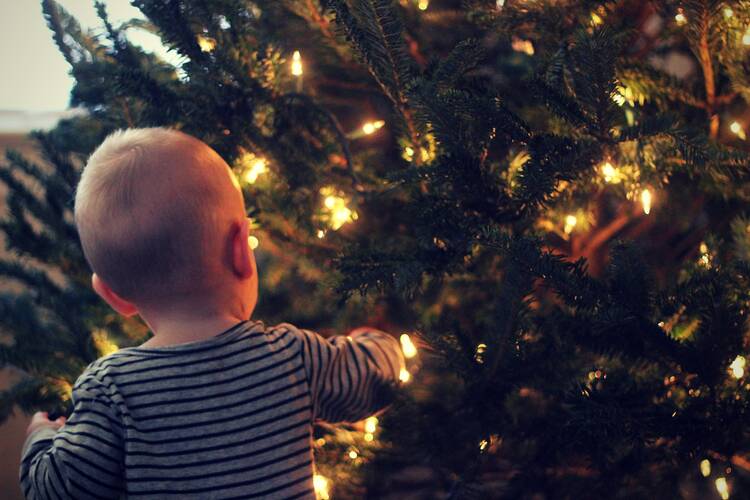This Advent, the season of waiting, my husband and I are blessed to be waiting for our first grandchild. “Any day now!” we holler and wave to the neighbors, grinning from ear to ear. Next to the wrapped presents for my children, who are now 30-somethings, are the exciting little gifts: an ornament celebrating baby’s first Christmas sits sparkling in its nest of tissue paper; a copy of the beloved Blueberries for Sal that is part of my family’s childhood literary canon; and onesies branded with the logo of my college alma mater. It has been fun shopping for these types of things—which I have not bought for years and years—for a new family member, my son’s son, a boy.
In some ways, I feel a little like I did when I was expecting many years ago. We have all the tingles that only the anticipation of new life brings. We are oohing and aahing over the soft garments waiting to be worn against completely new skin. My daughter and I are lovingly crocheting blankets that will be used to bundle a human who has never been bundled before. The bottle sterilizer is already sitting on the kitchen counter (my son’s and his wife’s, not ours), waiting to serve as the germ terminator for all things that will touch the newborn’s lips.
But in most ways, of course, it is not the same at all. It is not me who is feeling the baby somersaulting against my bladder and waking me up to go to the bathroom five times a night. I do not lie awake at night worrying about whether I will experience more minor labor pangs or blood-curdling, scream-inducing, outright labor pains. Certainly, for that I am very thankful.
But mostly I am thankful that my hopes and dreams for this child are different than they were for my own children. Because for them, I am embarrassed to admit, my ambitions were just that—ambitions. I wanted them to be beautiful, handsome, smart and accomplished. In short, I wanted them to be admired. And if you take that embarrassing thought to the next level, there is the awful realization that I wanted them to be admired because I wanted to be admired.
If parenthood teaches you anything, it is that your children are not inherently more admirable than your neighbors’ children. Sometimes markedly less so.
They will have screaming fits when they are told they cannot have that $12 balloon at the town carnival; they will crumple to the ground and howl while the whole town stares at you. They will wet their pants (or worse) 45 minutes after being dropped off at the new preschool, after you have proudly told the teacher that they are completely potty-trained with no accidents for weeks. They will lie to you about test grades, when their project is due, where they have been for the past two hours and whether they have ever smoked pot. They will never clean their rooms without being bribed. They will always (to this day!) leave dishes in the sink for you to find, like a special greasy, grimy present, when you get home from a long day at work. And that is the stuff you will look back on and laugh about. (The other stuff cannot be put in this essay without causing family strife!)
I would find myself dropping to my knees, bewildered and defeated, looking up at the cross and praying.
All that imperfection and unrealized ambition—theirs and mine—brought me back to the Catholic church I grew up in. At first, maybe it was just for the peace and quiet. Then, after years of rough patches, when I demanded too much from my kids, my husband and myself, I would find myself dropping to my knees, bewildered and defeated, looking up at the cross and praying. At the beginning I prayed for something closer to perfection, something a little more admirable at least, thinking that would make things better. And then gradually, after about 20 years, I finally come to the realization, deep in my bones, that my children and my family are not here to be admired. They are here to be loved.
Over those years of child-rearing from birth through college, I have to say my Advents got better and better. They became more about what happens when we go to church—the transformation, the humility, the grace—than about how we looked, all dressed up for church, or what accomplishments I would subtly boast about to the neighbors in the vestibule after church.
“‘My grace is sufficient for you, for power is made perfect in weakness.’ I will rather boast most gladly of my weaknesses, in order that the power of Christ may dwell with me.” (2 Corinthians, 12:9) It took me my children’s entire childhoods to learn the meaning of that passage.
So this Advent, just like with the coming of the baby Jesus, this baby, this grandchild, will for me be a second chance, an opportunity to get it right from the beginning. A chance to love without ambition and without seeking admiration. Thanks to more than 20 years of pondering the teachings, healings and sacrifices of that baby born in Bethlehem, my hopes for this child are that he will be loved abundantly and love generously in return. That he will spend more time admiring the world God gave us than he spends seeking admiration.
But also, for his parents’ sake, I do hope he cleans his room without being bribed and puts his dishes in the dishwasher before his parents get home from work.








